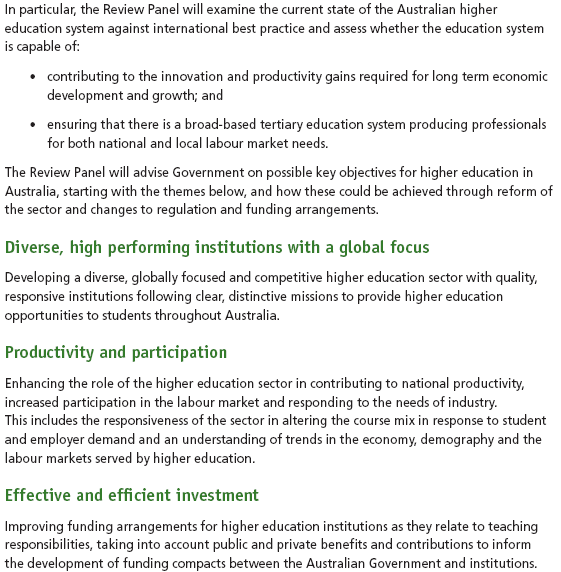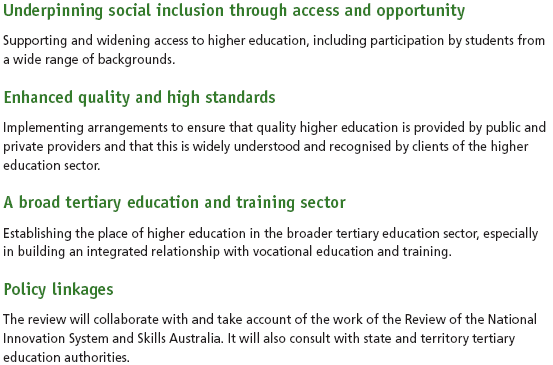|
|
|
|
|
|
|
News & Views item - June 2008 |
![]() Julia Gillard Talks the Talks Regarding the Higher Education Review. (June
11, 2008)
Julia Gillard Talks the Talks Regarding the Higher Education Review. (June
11, 2008)
Yesterday following her release of the Higher Education Discussion Paper at Macquarie University, the federal Minister for Education, Minister for Employment and Workplace Relations, Minister for Social Inclusion and acting Prime Minister Julia Gillard fronted the media in a doorstop.
Much of what she had to say was predicable, there was also a prescriptive odour about it: "We know that through the last decade, under the former Liberal government, universities have done it tough. Universities have faced a hostile environment, they have been micromanaged, they have been forced to accept Work Choices, the government’s extreme industrial relations agenda." But in the next breath: "... they haven’t had a chart for the future laid out; a map of the future and where it should lead for our great universities. The Rudd Labor Government is committed to changing that. ...Denise [Bradley] and her team will file an interim report to government in October with a final report due at the end of the year and I am very much looking forward to receiving both."
Just how much predetermination is in the mind of the Rudd government? We should have a good indication by the the beginning of 2009 and certainly by the time the 2009-10 budget papers are released.
In answer to the question : "Which do you consider to be the most important areas for discussion?" Ms Gillard replied: "...we are interested in people’s views on the future of universities and their distinctive missions. We think for too long the country has treated universities as if they were a one size fits all job they’re not. Each university in this country, in my view is straining to define its distinctive mission, its distinctive role in the nation’s future and we are particularly asking universities and those that care about them to talk to the Bradley Review about better funding structures to acknowledge that universities are different."
And a little later: "We are interested in a genuine collaboration [between government and the universities], the best of ideas brought together to define the future for Australian universities."
If there are two overworked meaningless phrases trotted out by minister's it is 1) with respect to the nation: we are punching above our weight and 2) as regards universities we must overcome the "one size fits all" approach. As regards (1) we aren't relative to the OECD, and (2) suggests a top down panacea; it won't work.
Note for example the implications in: "Research funding and research infrastructure support should be directed primarily to those areas within universities that can demonstrate both high performance in research and a research operation at a scale (that) is competitive in an international context." (page 46 of the Discussion Paper).
As long as the government avoids the realisation that it must be individuals and their research groups who are considered in funding not departments or clusters or hubs, Australian research will suffer as a consequence.
Referring to the Discussion Paper The Australian's Stephen Matchett had this to say:
But for all the talk, nothing fundamental has changed since the reforms John Dawkins put in place 20 years ago.
And we are out of time. There are parts of this report that read as if its authors do not want anybody to understand the problems they are pointing at. But the evidence is in it. The present failing funding model has produced “a strong incentive for universities to increase student:staff ratios, increase the rate of casualisation of the academic workforce, and pursue revenue from the same, limited number of other sources”, they report.
Ewart Wooldridge, the chief executive of the UK's Leadership Foundation for Higher Education, put it this way when interviewed by Aban Contractor for The Australian: "The culture of higher education is so different from either the public sector or the private sector. It's not about having a corporate approach; we're talking about a collection of communities where people are drawn together more by common values than by a single corporate goal."
Here are the:
Higher Education Review's Terms of Reference

